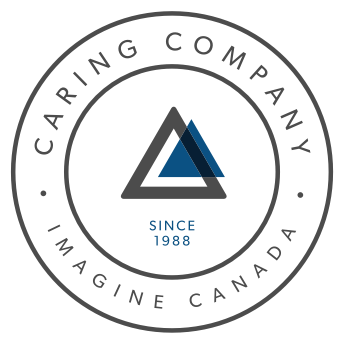Newly certified Caring Company Alberta Blue Cross on connecting to community through COVID-19
Catastrophic events expose the inequalities that persist within our society. For millions of Canadians, the COVID-19 pandemic has had dramatic consequences, especially for those who are most vulnerable. Short-term relief efforts are essential in times of crisis, and companies fortunate enough to have sustainable social purpose models are in a position to mobilize and support communities affected by the pandemic.
In a time when caring for communities is so essential, Alberta Blue Cross—a not-for-profit organization with a deep commitment toward social responsibility—has become the latest company to receive the Imagine Canada Caring Company Certification.
We connected with Rebecca Smillie, Manager of Community Impact at Alberta Blue Cross, who spoke with us about the organization’s charitable programs, their lasting impact on communities, and how their community investment efforts are supporting communities through COVID-19.

Can you tell us more about your overall approach to community investment?
Our community investment is tri-fold. We focus on programs, partnerships, and change agents which are our employees. Those are the three facets that guide our approach to working with communities.
Programs are internally-led initiatives that are sustainable. We have two key programs. The first, our Indigenous scholarships program, works to address the increased barriers indigenous people face in accessing post-secondary education by offering bursaries to students facing financial need. The second, our healthy communities grant program, is our way of contributing to the impact of space and how it contributes to active, healthy living—not just from a physical activity perspective, but also from a social determinants of health perspective.
Over the past two years, we have worked with the University of Alberta’s Centre for Healthy Communities to establish and understand what the impact is of this program and what it means for communities.
Does Alberta Blue Cross have strategic partnerships with nonprofit organizations you are particularly proud of? What makes it so impactful?
Absolutely. One we’re particularly proud of is a strong partnership we’ve formed with the Alberta Recreation and Parks Association (ARPA). It started as a partnership through our wellness strategy, that focused on a symposium that brought together community leaders to build capacity and grow impact. The relationship with ARPA has evolved and grown in only a few months.
When we talk about community partnerships, we are really looking at legacy. What is the legacy of our interactions in the nonprofit sector? An example of the legacy of this interaction is our COVID-19 response. Communities are facing tremendous turmoil as a result of this pandemic and part of our approach is a grassroots community program that will provide micro-grants from $500 to $5,000 to support communities across the province in their grassroots initiatives. The Alberta Recreation and Parks Association is our partner in this initiative.
It is just one example of how partnerships can be strategic, but also result in legacy.
The pandemic is changing the reality of many Canadians across the country, and the road to recovery will be a long process. You mentioned an initiative Alberta Blue Cross launched as a response of COVID-19. Has the crisis changed the way you approach community investment in any other ways?
Crisis demands action. There was this quote I read that said if you take the time to assess every angle in a crisis, you’ve likely waited too long. From a community investment perspective, we are being tasked with agility. We are collaborating with community partners across the province to participate in a coordinated effort that expands the reach of our resources and programs. I think a lot of companies, and funders specifically, are comfortable working in silos—they work with one service agency to deliver a program that is tangible and impactful.
What we are being tasked to do now, is to pool resources and do so in a way that maximizes impact and is responsive to what people are facing in that moment. That’s been a key shift for us. We’re looking at existing programs and saying, given what’s happening right now, how do we evolve these programs to ensure that our community partners and our community gets through this crisis and is set up in thrive in a whatever a new reality looks like.
Our big focus right now is resiliency. In Alberta, we have faced a lot in the last few years, from floods to fires. And because of that, coordinated efforts between funders and agencies are asking what sustainability of programming are we creating so that the community not only weathers this storm, but is able to weather the next. That’s what this coordinated effort is allowing us to do. If anything, the silver lining in the terrible new reality we are facing is that we are working together more effectively and more efficiently—and I think community is better served as a result.
Can you tell us more about your employee-led community program ‘Hearts of Blue’?
When I joined Alberta Blue Cross I thought that Hearts of Blue was the most unique thing about the organization. It is an employee-led charity that focuses on grassroots initiatives, grassroots organizations and providing in-kind donations. It allows our employees to be the citizens they wish through our organization. It’s a great outlet for employees to embody our values from the inside out. Hearts of Blue is inspiring. It is a true testament to the culture at Alberta Blue Cross.
How does achieving the Caring Company Certification fit into your company’s strategy?
This is a question that would be best answered by our Vice-President, but I think he would say that this certification is a reaffirmation and a recommitment to our community. Like renewing wedding vows – this is a renewal of Alberta Blue Cross’s vow to support community and work towards our vision. It is a reminder that despite the tremendous difficulties and the crisis that our communities are facing right now, Alberta Blue Cross stands with our community. We are here to help weather the storm. For us that’s what receiving the Caring Company Certification means. It means sustainable commitment to supporting our community.
Do you have any advice for other companies who may be thinking of developing a community investment program?
I would say seek out the voice of your community. A big difference that we are seeing right now as opposed to pre-COVID-19 is that communities are really driving the change. Small agencies, volunteer-run organizations—they are the ones with the voices that matter the most. They are the ones that are stepping up and creating the most impact. Go to the community and listen to their needs. Go to your customers and understand their pain points, then consider how the two intersect. That is your starting place.
___________
Caring Companies like Alberta Blue Cross are leaders that set the standard for corporate community investment in Canada. Through the Caring Company Certification, corporations are recognized for investing 1% of their pre-tax profit into the communities where their employees live and work. Alberta Blue Cross’s community investment is funnelled through their Foundation. Does your company give back to communities? Submit an application inquiry and learn more about becoming a Certified Caring Company.




